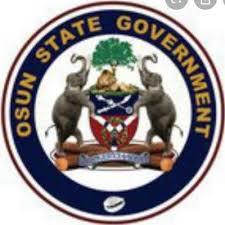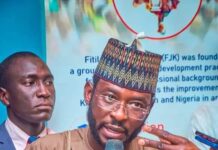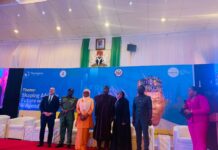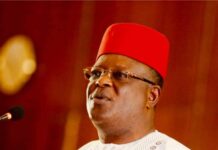STATE OF OSUN: Is Executive Lawlessness New Currency For Power By Dr. Jimoh Ibrahim
POLITICS DIGEST- In the last few weeks, a realist in the State of Osun again reechoed that local politics is about acquiring and exercising power. A confirmation that all politics, international and otherwise, was fraught with danger because of man’s deeply ingrained distrust of ‘the other.’ Such belief was further reinforced by the Leviathan thesis of Thomas Hobbes published in 1651, where he described the state of nature as Bellum omnium contra Omnes (‘war of all against all).
The currency now treading in the State of Osun is Power! To anyone who is not clear about the anatomy of the Leviathan in the State of Osun, a historic recall of similar events, for example, is the so-called ‘Catholic monarchs’ Ferdinand and Isabella of Spain (1479– 1516) expelled 170,000 Jews who refused their order to be ‘baptised.’ Henry VIII of England (1491–1547) imprisoned and executed those who would not sign his Act of Supremacy establishing the English monarch as head of the Church of England, including even his ‘good friend’ Thomas More Louis XIV of France (1638-1715). Repeatedly resulted in internal violence (repressive taxation, pillage, military subjugation, etc.) against those provinces that opposed his centralising policies. So who is dragging power with His Excellency? Rex est imperator in Regno suo – ‘the king is emperor in his own realm’ became the motto of the age.
Read Also:
What is to take home from the new Leviathan in the State of Osun? If the executive order were not pronounced as soon as he came to office, in his view, man’s life would be ‘solitary, poor, nasty, brutish and short.’ The sack of 12,000 workforces, suspension of Kabiyesis, and freezing of State public accounts created a burden of legitimacy on Leviathan with his reckless executive lawlessness and a confirmation that underscored the Leviathan thesis of Thomas Hobbes. The enthronement of the Leviathan in the State of Osun created unjust order resulting in a life of people’ solitary, poor, nasty, brutish and short’ with executive lawlessness capable of creating conditions for breaming anarchy. Human nature holds the key to understanding war and conflict, a ‘tragic’ in that they conceive politics as a perennial struggle for survival. Is the challenge critical to the anatomy of Human nature in the State of Osun?
The State of Osun is not in a state at war against itself in the context of Athens’ war with Sparta over hegemony in the Mediterranean world in the years 431−404 BC, even when we know that the History of the Peloponnesian War is commonly seen as the first depiction of power politics. (Apologies to Thucydides). Yes, all Realists agree that states can only ensure their survival through self-help strategies that allow them to defend themselves and their interests against another state’s aggression. But who is at war with the State of Osun?
The anatomy of the new Leviathan in the State of Osun looks like at the beginning and throughout their history, the great dynastic families of Europe-Tudor, Valois, Bourbon, Hapsburg, Wittlesbach, Hohenzollern, Savoy, Romanov, and so forth. – were motivated by territory, wealth, prestige, and power. The driving force was to consolidate and, wherever possible, extend their dynastic possessions, including political power, interest, and wealth. In any event, war, conquest. Power diplomacy is not out of strategic engagements.
The last question is if there is any respite for a man who paid a 97-billion-naira debt for the State of Osun, not borrowing for the children of tomorrow to repay in contemporary politics. His thinking that his name will be written in history and avoid the tragedy of the common in the political market is over, or it is a matter of regrets to be avoided when he has a second chance soon or never again!
Dr. Jimoh Ibrahim, Ph.D. (Cantab) CFR, is an outgoing Doctoral Candidate in Modern War and Contemporary Military History at the University of Buckingham. He is writing his second Ph.D. and has already submitted a thesis on Boko Haram and the Military challenges in Nigeria.

















